TIF (Tackling Inequalities Fund) journey so far in Greater Manchester
To help reduce the negative impact of Covid-19, and the widening of the inequalities on active lives, Sport England announced The Tackling Inequalities Fund in June 2020.
Share
Over the last 12-18 months many people’s activity levels have been affected by the pandemic in Greater Manchester.
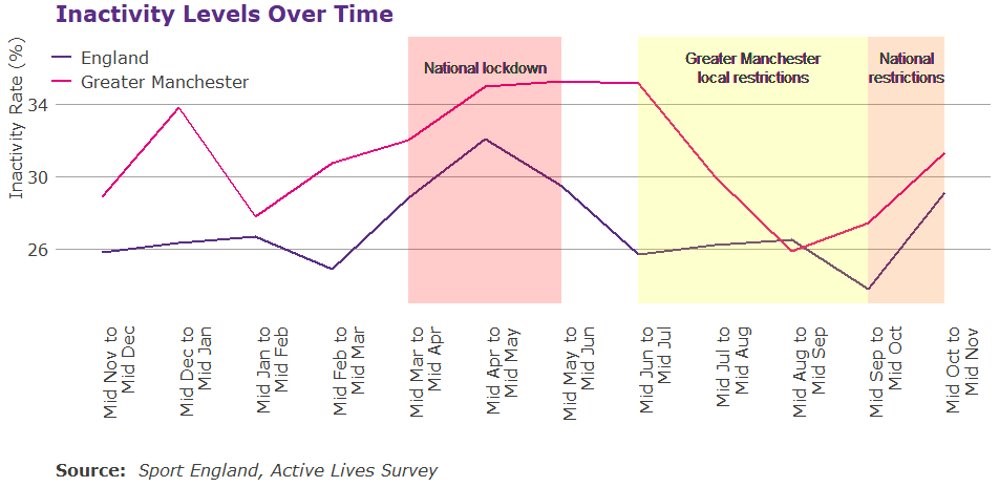
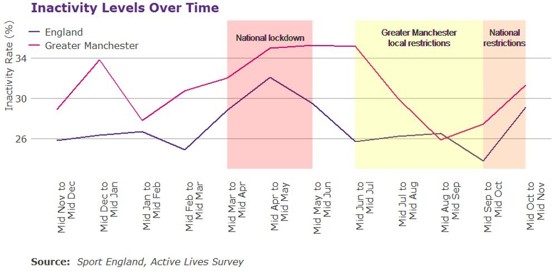
Not all groups or demographics were affected equally though, with women, young people aged 16-24, over 75s, disabled people and people with long-term health conditions, and those from Black, Asian, and other minority ethnic backgrounds most negatively impacted beyond the initial lockdown period.
To help reduce the negative impact of Covid-19 and the widening of the inequalities on active lives Sport England announced The Tackling Inequalities Fund (TIF) in June 2020.
GreaterSport have facilitated this investment in Greater Manchester working with organisations that have trusted relationships and networks with the ability to connect to the priority audiences.
The priority audiences were those from lower socio-economic groups and/or Black, Asian, and other minority ethnic backgrounds, and those with a disability or a long-term health condition.
Nationally this is a story of how we came together at a time when we all had to stay apart, to create real connections, with real people, to support them to be active when it was needed the most.
Locally, over £220,000 of funding has helped 53 organisations to reach the priority audiences across Greater Manchester. One of these were North Manchester Black Health Forum who said…
'We learnt the enormity of digital exclusion and inequalities faced by BAME communities during pandemic as most information, services and support provided was digital & in English.
"Here we were at a disadvantage as 80% of our participant didn’t have digital skills or means to buy equipment and are speakers of other languages.
"To combat this, we tried remote learning offered by other agencies but with our community already facing multiple barriers this proof to be impossible for same reasons.
"Therefore, we set up digital learning programme with language support to BAME people in small groups when allowed and by phone during lockdown.'
Learnings through phases 1 & 2
This programme is not just about providing the funding, it’s about learning from the process to ensure we are getting to the priority audience in the best possible way.
Process - Positive feedback on the early stages of the process – no complexity, extremely quick and the relationships built with funder during the process was a big catalyst to whether the fund was applied for.
Learnings – It would be helpful to humanise the process, sometimes difficult to put into writing, but by building ongoing relationships and trust, can gain a great build understanding through support.
Groups expressed value and gratitude in the collaborative relationship with the funder throughout the process that enabled them to overcome a number of barriers, including:
- Interpreting and understanding sport and Physical Activity sector language and the relevance of the fund, lack of knowledge and understanding in order to complete an appropriate application for the fund.
- Time needs to be taken to work in this approach, and building relationships is key for the panel to be successful.
- Small pots of funding do not allow long term approach, how do we build connections locally to sustain and grow what is started beyond funding.
Adaptations
Re-entry into lockdowns meant digital adaptations were necessary for projects to go ahead, unearthing even more challenges to support people in communities.
Digital illiteracy, digital language barriers, and the need for face-to-face were common.
Adaptations included extensive digital training, translating, and weeks of befriending phone calls.
TIF phase 3
For phase 3 our aim was to establish a GM Moving Equalities panel to specify the need and the process within GM for the phase, followed by decision making for the grants.
This was the opportunity to collectively ensure we are successful in distributing the fund, testing new approaches, and learning from the start to inform future phases.
We recognise the trusted relationships and networks of the panel members and the ability to connect to the priority audiences.
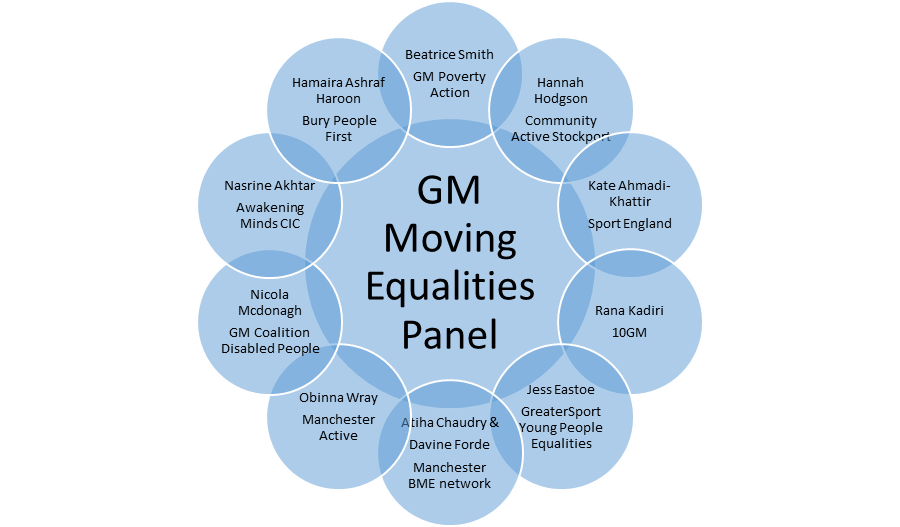
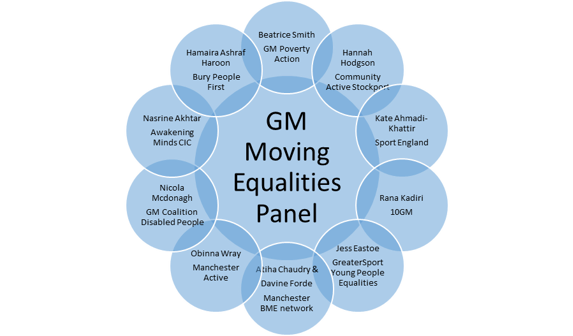
So far:
- Valued discussions and experience, great to hear everyone’s voice and input, with panel agreement as a collective
- Panel will connect to communities and people that need it the most
- Start of a longer term approach to working collectively to tackle inequalities
- The panel are currently working in communities and networks around TIF, with applications coming in for the decision panel later next week.
What we’ve learned about the role of the workforce
The panel has enabled us to:
- Identify key learnings and insight by connecting with their communities
- We learned that traditional support networks are helpful, but finding more local, tailored organisations is essential. Moving from signposting to larger infrastructure organisations and moving towards identifying organisations like Flourish who support women to make change, or the BME Social Enterprise Network who support social enterprises that are run either by or for ethnically diverse communities.
- The time taken for the panel to connect with applicants has identified key challenges and opportunities that otherwise would have been missed
- Consider appropriate sustainability approaches
- Identified keen appetite to engage people in workforce development – recognising where committing to Diversity and Inclusion training would strengthen a groups application
- How best to support groups who have no accounts and where to link in necessary support – to either identify a fiscal partner or capacity building opportunities.
- Understand the capacity needs for the panel to connect with potential applicants. Panel members fed back that connecting with groups is extremely rewarding but time consuming. Taking up to half a day per group, which opens opportunities to more than just TIF funding.
Latest News

Healthcare staff unite to celebrate movement and community wellbeing
GM Moving will be at Stretford parkrun on Saturday 5 July to support a celebration of health and movement being led by local healthcare staff from across Trafford.
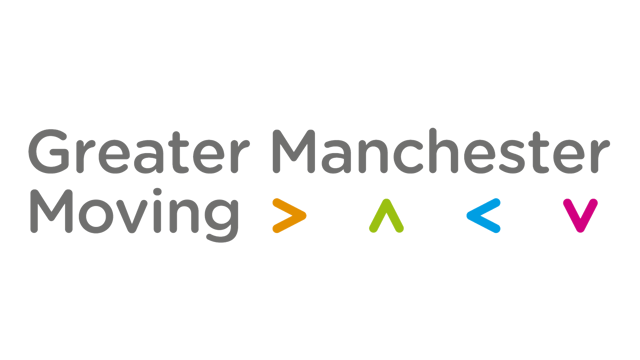
Active Lives for All: LGBTQ+ communities – we all have a role to play.
This Pride month, we take a deeper look at LGBTQ+ people’s experiences of sport and physical activity and what we can all do to support these communities to be active.

LGBTQ+ inclusion in sports clubs and organisations: Practical tips from Manchester Laces
To mark Pride 2025, we’re highlighting the incredible work of Manchester Laces, a club that’s showing how football can be truly welcoming and inclusive.
